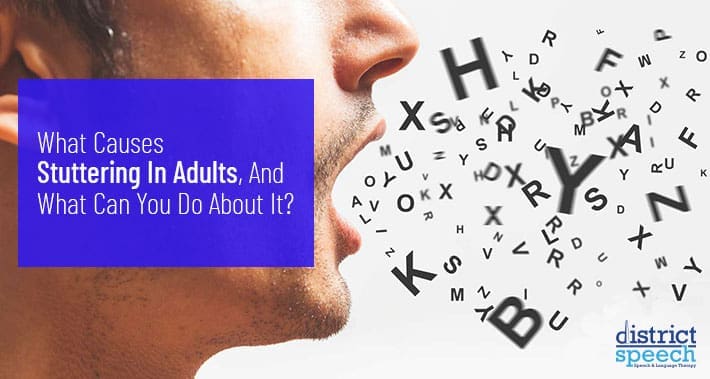
No one speaks with perfect clarity at all times — we all stammer and occasionally struggle to speak.
However, if you’re experiencing a frequent and significant struggle to speak fluently, you may have a stuttering impairment.
If you think you have a stuttering impairment, you may want to know more about stuttering; that’s what we’re here for.
Stuttering typically begins in childhood, but adults may also experience a later onset of speech disfluency, sometimes as a result of trauma, stroke or brain injury.
RELATED: Signs Your Toddler May Have A Speech Disorder
It may start suddenly, or you may have stuttered all your life.
Regardless, let’s talk about the causes of stuttering and what sort of stutter reduction speech therapy services are available to help.
What Is Stuttering?
Stuttering is a speech disorder also known as stammering or childhood onset fluency disorder, and it involves frequent issues with speech fluency and flow.
If you have a stutter, you may notice your speech is repetitive, interrupted, and prolonged.
Often a common occurrence in children learning to speak, stuttering may develop in adulthood for a variety of reasons.
Stuttering doesn’t happen because you don’t know what words you want to say; instead, stuttering is an issue with the actual ability of producing speech.
Certain words or sounds may be particularly difficult, which varies from person to person.
Stuttering is considered a fluency disorder, like cluttering disorder, but the two disorders manifest quite differently.
What Does Stuttering Look Like?
Repetition is a common manifestation of stuttering, where the individual repeats a word, sound, or a syllable.
Stuttering can also cause frequent pausing during speech as you work on formulating a problematic sound or word.
Other common signs of stuttering include:
- Prolonging a sound or word
- Filler sounds such as “um” or “uhh”
- Muscle tension in the face and upper body when speaking
- Broken words, or pauses within words
Stuttering may also cause visible physical symptoms including rapid blinking, facial tics, clenched fists, or lip and jaw tremors.
Emotions and certain conditions can worsen stuttering, such as stress, excitement, or lack of sleep.
Public speaking and talking on the phone are also common triggers.
What Causes Stuttering?
Children often experience stuttering as a normal part of learning to speak.
These cases of stuttering often fade with time or speech therapy for kids.
However, approximately 20-25% do not.
Adults may also develop a stutter due to various factors.
In fact, there are probably even famous adults who stutter that you might not know about!
Let’s look at some of the known causes of stuttering in adults.

1. Genetics
Over the past few decades, the evidence of genetic involvement in stuttering has accumulated to a staggering amount.
Those with family members who stutter are genetically more likely to have this speech condition, as documented through studies on genetic linkage and association.
Although genetics play a role in whether or not you experience stuttering, the severity of stuttering is not genetic.
Therefore, if your family member has a severe stutter, you’re at no greater risk for a severe stutter yourself.
Other factors may work in tandem with a genetic predisposition to increase your chances of developing a stutter.
2. Child Development
If you experienced speech issues as a child, it may continue through to adulthood or may resurface at some point in your life.
When developmental stuttering occurs in children it’s typically between two and six years old.
Depending on the severity and length of time it lasts, it’s usually resolved either on its own or with speech therapy.
However, stuttering may reoccur in adulthood due to an underlying issue with speech motor control processes.
If your child shows signs of a stutter, it’s a good idea to book an appointment at District Speech as soon as possible.
Early intervention speech therapy tends to have better results than treatment later in life.
In fact, it’s never too early to begin speech therapy for children.
3. Environmental Factors
Environmental factors can have an impact on stutter development and longevity.
Studies have examined the role between expressed emotions and stuttering.
Expressed emotions is a term used to describe the often critical and hostile treatment of people who stutter from family members and society as a whole.
According to the above study, children can “develop stuttering because of derogatory and critical comments related to speech by their family members“.
The consequences of socio-familial factors can extend far beyond childhood and cause a long-term stutter, or the reoccurrence of a once-experienced stutter.
This may lead to the need for speech therapy treatment for adults.
4. A Side Effect Of Medication
If you notice a sudden onset stutter and you’re taking a new medication, the two may be related.
A number of pharmaceutical medications have speech issues listed as a known side effect.
The medications that have the potential to cause a stutter are often drugs affecting neurotransmitter systems, including:
- Amitriptyline – an antidepressant
- Sertraline – an antidepressant
- Methylphenidate – an ADHD medication better known as Ritalin
- Lomustine – a drug used to treat brain tumors
If you’re taking one of these medications, speak to your doctor about possible alternatives.
5. Idiopathic Stuttering
You may be reading the above causes and thinking none of them apply to you and your speech condition.
Idiopathic stuttering is the term for a sudden onset stutter caused by unknown reasons.
However, just because there is no discernible cause doesn’t mean there’s nothing you can do about it.
Speech language pathology can still help resolve your idiopathic speech fluency issue.
6. Other Causes
There are various other causes that may be causing or exacerbating your stutter.
Neurogenic stuttering is another common cause of stuttering in adults, and it’s caused by traumatic brain injury, stroke, or other traumatic event.
If it comes as a result of a stroke, you may also need speech therapy treatment for aphasia, since the two are linked.
Stuttering can also develop as a result of intense stress.
Whether it’s stress due to an event such as a car accident, or something more routine such as financial or familial stress, your speech fluency may be affected.
Speech Therapy For Adults Who Stutter
From genetic to environmental factors, and whether or not you experienced a stutter as a child — speech therapy can help you reduce the amount of stuttering you experience.
A speech language pathologist for adults can determine the type of stuttering and best treatment for you and your individual needs.
Speech therapy can help you develop effective communication and improve your speech fluency.
Alongside traditional speech therapy, your speech language pathologist may use various methods including cognitive behavioral therapy and delayed auditory feedback devices, because different treatment options work for different people and in different settings.
Another important aspect of adult speech therapy is decreasing anxiety, improving your mental health, and encouraging you to be confident in your speech.
Your speech therapist will work with you to embrace your speech skills and not let stuttering stop you from living your life to the fullest.
Book Your Appointment With District Speech Today
Stuttering can cause immense stress and anxiety, but you don’t have to suffer alone.
Speech therapy is a powerful tool that can help you overcome your speech problems and help you communicate confidently and without issue.
For more information on how speech and language therapy can help resolve a speech fluency issue, contact us at District Speech.
We can help determine which treatment options work best for you, to ultimately achieve the goal of improving communication.
If you’d like to consult with one of our speech and language therapists, don’t hesitate to contact us.
Book an appointment today and meet with one of our speech-language pathologists in Washington, and start your journey to enjoy true freedom in your speech.
Book your appointment with District Speech today.
1300 I St NW, Suite 400 E,
Washington, DC 20005
- https://g.page/districtspeech
District Speech and Language Therapy specializes in speech therapy, physical therapy, and occupational therapy solutions, for both children and adults, in the Washington D.C and the Arlington Virginia areas.